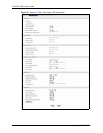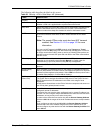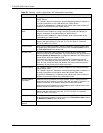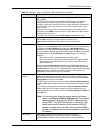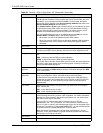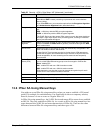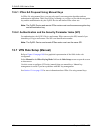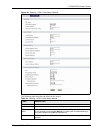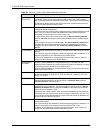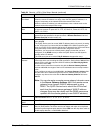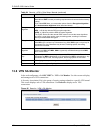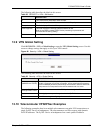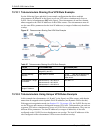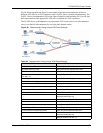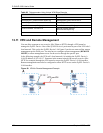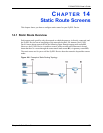
P-334U/P-335U User’s Guide
162 Chapter 13 IPSec VPN
DNS Server (for
IPSec VPN)
If there is a private DNS server that services the VPN, type its IP address here.
The ZyXEL Device assigns this additional DNS server to the ZyXEL Device's
DHCP clients that have IP addresses in this IPSec rule's range of local addresses.
A DNS server allows clients on the VPN to find other computers and servers on
the VPN by their (private) domain names.
Local Policy Local IP addresses must be static and correspond to the remote IPSec router's
configured remote IP addresses.
Two active SAs can have the same configured local or remote IP address, but not
both. You can configure multiple SAs between the same local and remote IP
addresses, as long as only one is active at any time.
In order to have more than one active rule with the Secure Gateway Address
field set to 0.0.0.0, the ranges of the local IP addresses cannot overlap between
rules.
If you configure an active rule with 0.0.0.0 in the Secure Gateway Address field
and the LAN’s full IP address range as the local IP address, then you cannot
configure any other active rules with the Secure Gateway Address field set to
0.0.0.0.
Local Address For a single IP address, enter a (static) IP address on the LAN behind your ZyXEL
Device.
For a specific range of IP addresses, enter the beginning (static) IP address, in a
range of computers on your LAN behind your ZyXEL Device.
To specify IP addresses on a network by their subnet mask, enter a (static) IP
address on the LAN behind your ZyXEL Device.
Local Address
End /Mask
When the local IP address is a single address, type it a second time here.
When the local IP address is a range, enter the end (static) IP address, in a range
of computers on the LAN behind your ZyXEL Device.
When the local IP address is a subnet address, enter a subnet mask on the LAN
behind your ZyXEL Device.
Local Port Start 0 is the default and signifies any port. Type a port number from 0 to 65535. Some
of the most common IP ports are: 21, FTP; 53, DNS; 23, Telnet; 80, HTTP; 25,
SMTP; 110, POP3.
Local Port End Enter a port number in this field to define a port range. This port number must be
greater than that specified in the previous field. If Local Port Start is left at 0,
Local Port End will also remain at 0.
Remote Policy Remote IP addresses must be static and correspond to the remote IPSec router's
configured local IP addresses. The remote fields do not apply when the Secure
Gateway IP Address field is configured to 0.0.0.0. In this case only the remote
IPSec router can initiate the VPN.
Two active SAs cannot have the local and remote IP address(es) both the same.
Two active SAs can have the same local or remote IP address, but not both. You
can configure multiple SAs between the same local and remote IP addresses, as
long as only one is active at any time.
Remote Address For a single IP address, enter a (static) IP address on the network behind the
remote IPSec router.
For a specific range of IP addresses, enter the beginning (static) IP address, in a
range of computers on the network behind the remote IPSec router.
To specify IP addresses on a network by their subnet mask, enter a (static) IP
address on the network behind the remote IPSec router.
Table 54 Security > VPN > Rule Setup: Manual (continued)
LABEL DESCRIPTION



